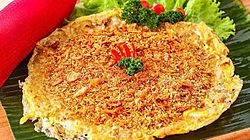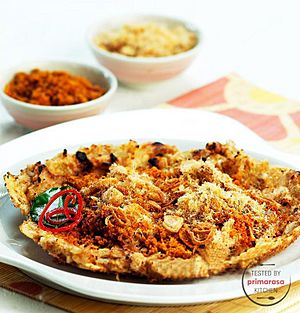Quick facts for kids
Kerak Telor
 |
| Course |
Snack |
| Place of origin |
Indonesia |
| Region or state |
Greater Jakarta |
| Serving temperature |
Hot |
| Main ingredients |
Spicy omelette of duck or chicken egg mixed with glutinous rice sprinkled with serundeng coconut granules and fried shallots |

Kerak Telor, a tasty Indonesian snack made with eggs and coconut, cooked over a traditional charcoal fire.
Kerak Telor is a super yummy and traditional snack from Jakarta, Indonesia. Its name means "Egg Crust" in English. This special dish is like a spicy omelette. It's made with sticky rice and eggs, then topped with crunchy fried coconut, fried onions, and dried shrimp. People usually enjoy Kerak Telor as a snack, not a main meal. You can easily find vendors selling it at the yearly Jakarta Fair. It's a must-try for anyone visiting the event!
How Kerak Telor is Made
Making Kerak Telor is a cool process to watch! Each serving is made fresh when you order it.
- First, the vendor puts a small amount of ketan (which is sticky rice) into a small pan called a wok.
- This pan is then heated over a charcoal fire.
- Next, an egg is added. Vendors can use either chicken or duck eggs. Many people think duck eggs taste even better!
- Some special spices are mixed in with the rice and egg.
- The mixture is fried in the wok without any cooking oil. This makes the omelette stick to the pan.
- Once it's partly cooked, the vendor flips the wok upside down. This cooks the top of the omelette directly over the charcoal fire until it's perfectly done.
- Finally, the hot omelette is sprinkled with spicy serundeng (sweet grated coconut), ebi (dried salted shrimp), and fried shallots. It's ready to eat!
The History of Kerak Telor
Kerak Telor has a long and interesting history. Back when Indonesia was under colonial rule, Kerak Telor was a fancy food. It was often served at big parties for the government officials or wealthy Betawi families.
Experts say that Kerak Telor was invented to make plain sticky rice more exciting and delicious. Today, you'll find many Kerak Telor vendors. Not all of them are from Jakarta. Some come from other Indonesian cities like Padang, Tegal, Garut, and Cimahi. This shows how popular and widespread this traditional snack has become!







